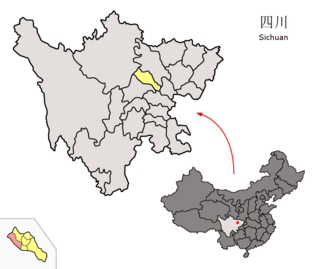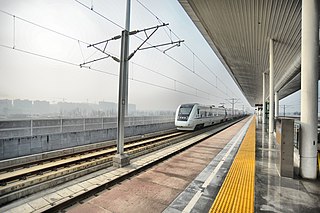Related Research Articles

Sichuan cuisine or Sichuanese cuisine, alternatively romanized as Szechwan cuisine or Szechuan cuisine, is a style of Chinese cuisine originating from Sichuan province and the neighboring Chongqing municipality. Chongqing was formerly a part of Sichuan until 1997, thus there is a great deal of cultural overlap between the two administrative divisions. There are many regional, local variations of Sichuanese cuisine within Sichuan and Chongqing.

Sichuan is a province in Southwest China occupying most of the Sichuan Basin and the easternmost part of the Tibetan Plateau between the Jinsha River on the west, the Daba Mountains in the north and the Yungui Plateau to the south. Sichuan's capital city is Chengdu. The population of Sichuan stands at 83 million. Sichuan neighbors are Qinghai to the northwest, Gansu to the north, Shaanxi to the northeast, Chongqing to the east, Guizhou to the southeast, Yunnan to the south, and the Tibet Autonomous Region to the west.

Chengdu is the capital city of the Chinese province of Sichuan. With a population of 20,937,757 at the 2020 Census, it is the fourth most populous city in China, and it is the only city apart from the four direct-administered municipalities with a population of over 20 million. It is traditionally the hub of Western China.

The Dujiangyan is an ancient irrigation system in Dujiangyan City, Sichuan, China. Originally constructed around 256 BC by the State of Qin as an irrigation and flood control project, it is still in use today. The system's infrastructure develops on the Min River (Minjiang), the longest tributary of the Yangtze. The area is in the west part of the Chengdu Plain, between the Sichuan Basin and the Tibetan Plateau. Originally, the Min would rush down from the Min Mountains and slow down abruptly after reaching the Chengdu Plain, filling the watercourse with silt, thus making the nearby areas extremely prone to floods. King Zhao of Qin commissioned the project, and the construction of the Dujiangyan harnessed the river using a new method of channeling and dividing the water rather than simply damming it. The water management scheme is still in use today to irrigate over 5,300 km2 (2,000 sq mi) of land in the region and has produced comprehensive benefits in flood control, irrigation, water transport and general water consumption. Begun over 2,250 years ago, it now irrigates 668,700 hectares of farmland. The Dujiangyan, the Zhengguo Canal in Shaanxi and the Lingqu Canal in Guangxi are collectively known as the "three great hydraulic engineering projects of the Qin."

Dujiangyan is a county-level city of Sichuan Province, Southwest China, it is under the administration of the prefecture-level city of Chengdu. Its north-west region forms a border with southern Ngawa Tibetan and Qiang Autonomous Prefecture. It has an area of 1,208 km2 (466 sq mi) and had a population of 600,000 in 2003.

Deyang is a prefecture-level city of Sichuan province, China. Deyang is a largely industrial city, with companies such as China National Erzhong Group and Dongfang Electric having major operations there. The city is rich in history, with the Sanxingdui archeological site in Guanghan uncovering a rich trove of bronze and gold masks. More recently, Deyang was greatly afflicted by the 2008 Sichuan earthquake, which particularly impacted its county-level cities of Mianzhu and Shifang, in Deyang's northwest. Deyang spans an area of 5,911 km2 (2,282 sq mi).

Chengdu Shuangliu International Airport is a major air hub of Western China and one of the two international airports serving Chengdu, the capital of China's Sichuan province, the other one being Chengdu Tianfu International Airport (TFU). It mainly serves domestic flights around China.

Guangyuan is a prefecture-level city in Sichuan Province, China, bordering the provinces of Shaanxi to the northeast and Gansu to the northwest. The city has a population of 2,305,657 as of the 2020 census.

Sichuanese or Szechwanese (simplified Chinese: 四川话; traditional Chinese: 四川話; Sichuanese Pinyin: Si4cuan1hua4; pinyin: Sìchuānhuà; Wade–Giles: Szŭ4-ch'uan1-hua4), also called Sichuanese/Szechwanese Mandarin (simplified Chinese: 四川官话; traditional Chinese: 四川官話; pinyin: Sìchuān Guānhuà), is a branch of Southwestern Mandarin spoken mainly in Sichuan and Chongqing, which was part of Sichuan Province until 1997, and the adjacent regions of their neighboring provinces, such as Hubei, Guizhou, Yunnan, Hunan and Shaanxi. Although "Sichuanese" is often synonymous with the Chengdu-Chongqing dialect, there is still a great amount of diversity among the Sichuanese dialects, some of which are mutually unintelligible with each other. In addition, because Sichuanese is the lingua franca in Sichuan, Chongqing and part of Tibet, it is also used by many Tibetan, Yi, Qiang and other ethnic minority groups as a second language.

Chengdu Tiancheng F.C. was a Chinese professional football club based in Chengdu, China who last played in the 26,000 seater Shuangliu Sports Center in the China League One division. The club was founded on 26 February 1996 and was formerly known as Chengdu Five Bulls named after their first sponsor, the Five Bulls Cigarette Company. However, the club was officially dissolved on 4 January 2015 and was subsequently de-registered by the Chinese Football Association on 31 January 2015 due to unpaid salaries to players and staff.
Song Zhenyu is a Chinese former footballer who played as a goalkeeper.
The 2008 China League Two started in April 2008 and ended in December 2008. Guangdong Sunray Cave and Shenyang Dongjin finished top-2 and promoted to China League One 2009.

Shifang is a county-level city in Sichuan, China, under administration of Deyang prefecture-level city. It is located directly about 50 kilometers (31 mi) from Chengdu. It had an area of 863 km2 (333 sq mi) and a population of 430,000 in 2004. Shifang has a history stretching back over two thousand years. It suffered heavy damage during the 2008 Sichuan earthquake. The city was also the scene of a large-scale environmental protest against a copper smelting plant in July 2012.

Wang Zheng is a Chinese hammer thrower. Her personal best throw is 77.68 metres, achieved on 29 March 2014 in Chengdu, which was an Asian record.

Zhang Jie, also known as Jason Zhang, is a Chinese pop singer. He made his television series debut in the reality singing competition My Show in 2004, which he won.

Chengdu East or Chengdudong railway station is a railway station in Chenghua District, Chengdu, the capital of Sichuan province, serving the Chengdu–Chongqing intercity railway, the Chengdu–Guiyang high-speed railway, the Dazhou–Chengdu railway and Xi'an–Chengdu high-speed railway. It is connected to Chengdu Metro Line 2 and Line 7.

The Chengdu–Dujiangyan intercity railway is a dual-track, electrified, passenger-dedicated, higher-speed rail line in Sichuan Province, connecting the provincial capital, Chengdu with the satellite city of Dujiangyan. The line is 65 kilometres (40 mi) in length with 15 stations. China Railways CRH1 train set on the line reach a maximum speed of 220 kilometres per hour (140 mph) and make the full-trip in 30 minutes, before 2018. The line was built in 18 months and entered into operation on May 12, 2010. The railway is built to withstand an 8.0-magnitude earthquake. The Chengdu–Dujiangyan intercity railway has two branch lines: Pengzhou Branch line is 21.2 kilometres (13.2 mi) in length with 6 stations, and Lidui Branch line is 6 kilometres (3.7 mi) in length with 3 stations. In 2019, China Railways CRH6A-A (Tianfu) train sets on the line started to operate up to 200 kilometres per hour (120 mph).
Chengdu–Mianyang–Leshan intercity railway is a higher-speed intercity railway in Sichuan Province that connects Mianyang, Chengdu, Deyang, Meishan, Emei and Leshan. The line is 314 km (195 mi) in length and can accommodate trains traveling at the speed of 200 km/h (124 mph). Construction began in 2008 and was completed on June 29, 2014. Revenue service began on December 20, 2014.

Dandan noodles or dandanmian, literally "carrying-pole noodles", is a noodle dish originating from Chinese Sichuan cuisine. It consists of a spicy sauce usually containing preserved vegetables, chili oil, Sichuan pepper, minced pork, and scallions served over noodles. The dish can either be served dry or as a noodle soup.

Ayu Diandra Sari Tjakra is an Indonesian presenter, doctor, fashion model and a Beauty pageant titleholder who won the title of Puteri Indonesia Lingkungan 2008. She represented Indonesia at the Miss International 2009 pageant in Chengdu, China.